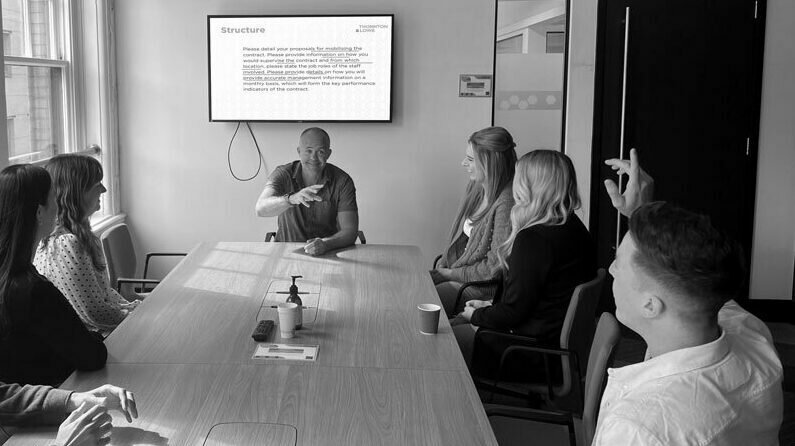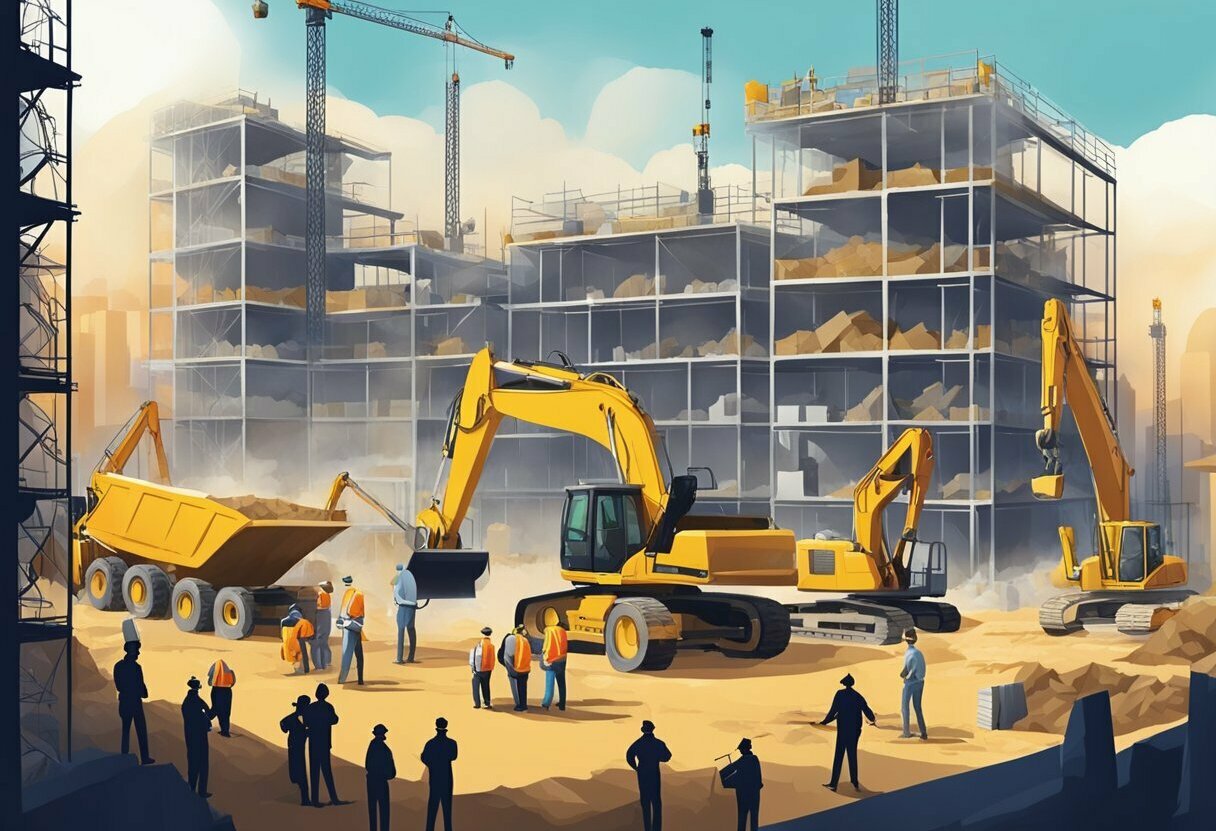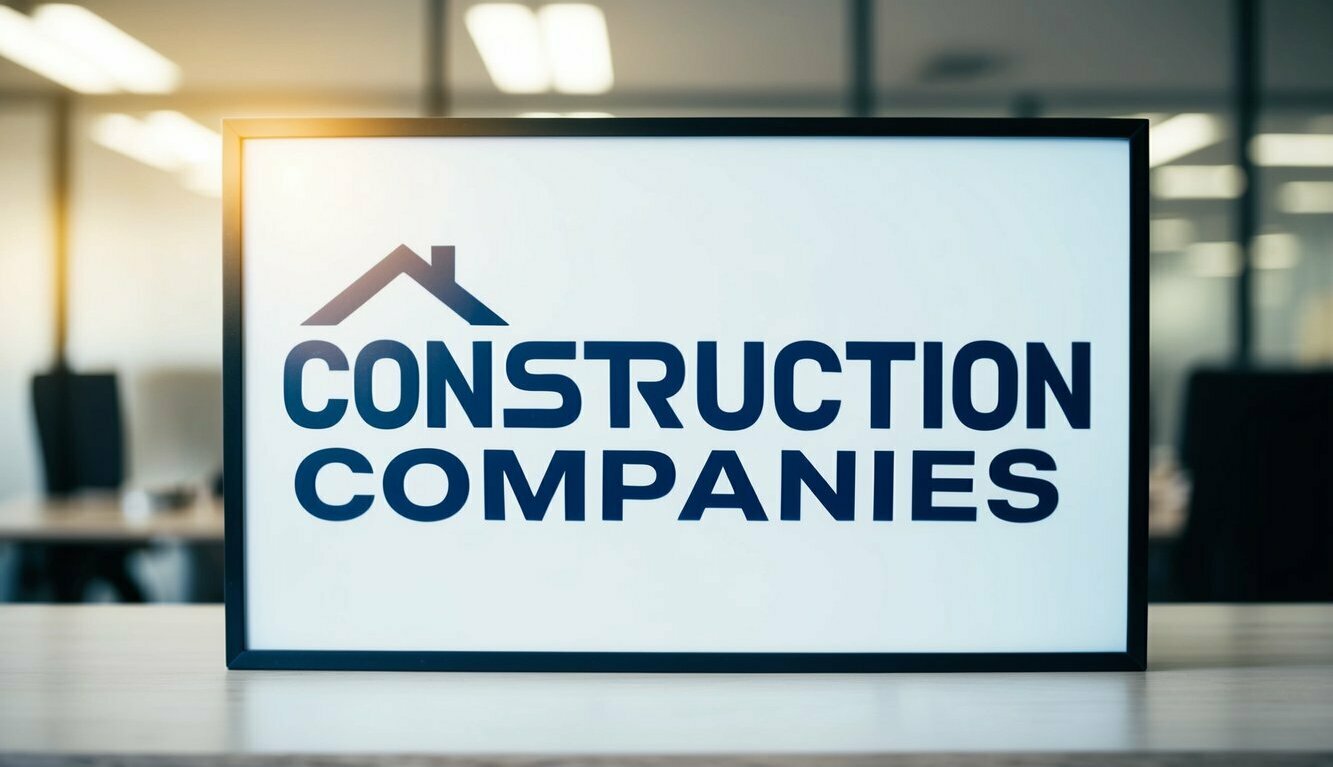Looking to win work with Tier 1s or move up their supply chains? This page explains what Tier 1 means, how opportunities flow to Tier 2 and Tier 3 suppliers, and the practical steps that get you noticed by major contractors.
Get construction bid supportWhat is a Tier 1 Construction Company?
A Tier 1 construction company is a large main contractor that manages big building projects and hires other companies to do parts of the work. They’re called Tier 1 because they sit at the top of the supply chain, dealing directly with the client and taking overall responsibility for the project.
What are the supply chain opportunities?
The main supply chain opportunities Tier 1 construction companies have are for subcontractors, suppliers, and consultants to help deliver different parts of the project. This is because Tier 1s don’t do all the work themselves - they rely on trusted partners to provide labour, materials, equipment, and specialist services.
How to become part of a Tier 1 construction company’s supply chain
Start by making contact - whether that’s a call, email, LinkedIn message, intro at an event, or even a letter - or a combination of all of these. This is what we do as part of our Marketing Services for clients, as well as bid writing. You can also get noticed through a formal tender or by registering on approved systems like Constructionline or CHAS or specific versions depending on the sector. These help show you meet their basic standards. But none of that matters if you haven’t spoken to someone. Try reaching out to Procurement, a Supply Chain Manager or anyone involved in buying or project delivery - just keep it simple and start the conversation.
Understanding tier 1, 2, and 3 Construction Contractors
To understand what Tier 1 construction companies are in the UK, let's look at how they are categorised in the construction industry:
- Tier 1 Construction Construction Companies:
- Large, well-established companies with decades of experience
- Directly contract with clients and manage the overall construction project
- Also known as general contractors
- Focus on contract management and subcontracting work to Tier 2 and Tier 3 subcontractors
- Use estimating teams to calculate project costs, including subcontractor fees, materials, and other expenses
- Bid for and win large-scale, complex projects such as major infrastructure projects, hospitals, schools, and commercial developments, often valued at hundreds of millions or even billions of pounds
- Tier 2 Contractors:
- Medium-sized companies with specialised expertise in specific trades
- Work as subcontractors for Tier 1 contractors
- Directly manage and execute their part of the construction work
- Examples include mechanical, electrical, and plumbing (MEP) contractors, structural steel fabricators, and concrete specialists
- Tier 3 Contractors:
- Smaller companies or individual tradespeople
- Subcontracted by Tier 1 or Tier 2 contractors to perform specific tasks
- Examples include painters, drywall installers, and landscapers.

Top Tier 1 Construction Companies In The UK
In the UK, Tier 1 construction companies lead the industry with their scale and capability. They handle large, complex projects that require extensive resources and skilled labour. Here are some of the top firms:
- Morgan Sindall: This company topped rankings in 2023 by winning £2.2 billion worth of work. They excel in diverse contracts, showing versatility in construction.
- Kier Group: Known for their extensive portfolio, Kier competes closely with Morgan Sindall in various sectors, including infrastructure and commercial projects.
- Balfour Beatty: A major player in construction and engineering, Balfour Beatty is involved in several high-profile projects across the UK, focusing on sustainability and innovation.
- Skanska UK: This firm is part of the global Skanska group, known for its commitment to sustainability and efficiency in construction processes.
- Willmott Dixon: Recognised for delivering quality in housing and commercial sectors, Willmott Dixon stands out for its community-focused approach.
In 2024, companies like EDF Energy Customers Limited and Sizewell C Limited also made waves in project values, show the demand for reputable construction partners.
These Tier 1 companies offer opportunities within the supply chain, enabling smaller businesses to engage in large-scale projects. Aligning with these firms can enhance your business prospects in the construction sector.

Supply chain opportunities with tier 1 Contractors
Understanding the dynamics of the construction supply chain can open various opportunities for suppliers. Engaging with Tier 1 contractors can lead to valuable partnerships and sustained business growth.
Opportunities For Tier 2 And Tier 3 Suppliers
Tier 2 and Tier 3 suppliers have unique opportunities when partnering with Tier 1 contractors. They can use their specialised skills and flexible services to meet specific project needs. This flexibility is vital, especially during times of increased demand.
Engaging with Tier 1 contractors often means gaining access to larger projects. You can demonstrate your capabilities and establish a solid reputation in the industry. Many Tier 1 companies seek local suppliers to improve turnaround times, social value, and lower costs. Prioritising sustainability and eco-friendly materials can also make you more attractive to potential partners.
Winning Work With Tier 1 Contractors
By monitoring who is winning large construction projects, contractors can analyse who are the best to approach in their local area or based on their specialist area. Many Tier 1 construction companies also have a formal process for engaging their supply chain. These private sector tenders can be accessed via their supplier or tender portals and you will have access to join their preferred supplier list (PSL).
Importance Of Building Strong Relationships With Tier 1 Contractors
Building strong relationships with Tier 1 contractors is essential for securing ongoing work and once you have the initial 'foot in the door' it is then down to price and performance. Regular interactions and updates ensure that everyone is on the same page, reducing the risk of misunderstandings and keeping your name at the top of the list.
Participating in joint ventures or collaborative projects can further strengthen these connections. Being dependable and meeting deadlines will only enhance your reputation. Many Tier 1 contractors prefer partnering with suppliers they know and trust. Staying proactive and consistently delivering high-quality services will help you position yourself favourably within the supply chain.
Supply chain development initiatives by tier 1 Contractors
Tier 1 construction companies are actively implementing various initiatives to improve their supply chains. These efforts ensure efficiency, improve relationships with suppliers, and can create innovation. In many public sector tenders there is often an expectation they will engage and develop local SMEs as part of their social value commitment.
Vendor Development Programs
You will find that many Tier 1 contractors invest in vendor development programmes. These programmes focus on identifying and nurturing small and medium-sized suppliers. By providing financial support, training, and resources, these contractors strengthen their supply chains.
This approach not only boosts the capabilities of vendors but also promotes local economies. Training sessions often cover quality standards, compliance, and delivery timelines. As suppliers improve, you benefit from more reliable and competitive options in your supply chain.
Capacity Building And Training For Subcontractors
Another key initiative is capacity building for subcontractors. You might notice Tier 1 companies offering workshops and training sessions. These programs aim to elevate the skills and competencies of subcontractors to meet project demands.
Common areas of focus include safety standards, project management, and technical skills related to construction methods. By investing in the workforce, Tier 1 contractors enhance subcontractors' performance. This, in turn, reduces delays and increases project quality, providing you with more dependable outcomes.
Technology Adoption And Digitalisation In The Supply Chain
You should also consider the role of technology adoption in supply chain initiatives. Tier 1 contractors are increasingly embracing digital tools to streamline operations. This includes using software for project management, inventory tracking, and communication.
By implementing digital solutions, contractors can improve their planning and scheduling. Real-time data access helps make informed decisions quickly. Consequently, your supply chain becomes more agile and responsive to changes in demand or unforeseen challenges.
Pros and cons of working as a subcontractor for tier 1 construction companies
Working as a subcontractor for Tier 1 companies can offer both benefits and challenges. Understanding these aspects can help you make informed decisions about your career.
Pros Of Working With Tier 1 Construction Companies
Working with Tier 1 construction companies can help smaller businesses grow. These large firms often offer training opportunities, helping you develop your skills and understand their expectations. This not only improves your performance but also prepares you for managing larger contracts independently in the future.
Additionally, partnering with Tier 1 companies can open doors to new projects, increase credibility, and provide steady work, as these firms often rely on trusted subcontractors for their supply chain needs.
Cons Of Working With Tier 1 Construction Companies
One significant drawback is the pressure of tight deadlines. Tier 1 companies often push for speed to meet project timelines. This can lead to a stressful work environment and may affect the quality of your output.
Another issue is limited control over the project. As a subcontractor, you typically follow the directives of Tier 1 contractors. This means your creativity and decision-making power can be restricted.
Payment terms can also be a concern. Tier 1 companies may take longer to process payments, which can cause cash flow problems for smaller subcontractors.
Lastly, being a subcontractor might mean less job security. Projects may end when contracts are up, leaving you to seek new opportunities frequently. There are also many examples of Tier 1 construction companies going bust, such as Carillion and most recently ISG. Monitor this closely and do not put all your 'eggs in one basket'!

What do tier 1 construction companies expect from subcontractors?
To work with Tier 1 construction companies, you’ll often be expected to have:
- Health and safety compliance and certifications like CHAS, Constructionline, or SSIP are essential.
- A solid Quality Management System (e.g. ISO 9001) and Environmental Management (e.g. ISO 14001).
- Clear Health & Safety, Equality & Diversity, and Sustainability policies are expected.
- Proven track record through previous project references or case studies.
Tier 1 construction companies expect professionalism, reliability, and compliance with industry standards. Your delivery is a direct reflection on them! This means getting your business proposals right.
Strategies for success as a subcontractor
To thrive as a subcontractor in the construction industry, you need to focus on several key strategies.
Differentiate Through Specialisation And Value-Added Services
To stand out, consider specialising in specific areas of construction. This could include niche services like electrical work, plumbing, or HVAC systems. By honing your skills in a particular field, you can become known as an expert.
Offer value-added services, such as design consultations or maintenance packages. This not only increases your appeal but also helps you create additional revenue streams. Clients often prefer subcontractors who can provide more comprehensive solutions.
Invest In Technology And Innovation
Investing in the latest technology can greatly enhance your capabilities. Tools such as construction management software and mobile apps enable you to streamline processes and improve communication among team members.
Adopting Building Information Modelling (BIM) can also help you visualise projects more effectively. This technology allows for better planning and can reduce costly mistakes. If you can track progress and resources using innovative tools, you will gain a competitive edge.
Innovation also extends to materials. Using sustainable or advanced materials can appeal to eco-conscious clients. Stay updated with industry trends to innovate your services continuously.
Prioritise Health, Safety, And Quality
Health and safety should be at the forefront of your operations. Implement strict safety protocols and ensure all team members are trained in best practices. Regular safety audits can help spot potential issues before they become serious problems.
Quality control is equally important. Develop a standardised process to monitor your work and maintain high-quality standards. Seek feedback from clients and make necessary adjustments. A commitment to safety and quality not only protects your workers but also builds your reputation.
Make sure to stay compliant with legal requirements and industry regulations. Investing in safety and quality will safeguard your workforce and reinforce your position in the market.
Manage Financial Risks And Maintain A Strong Balance Sheet
Careful financial management is very important in the construction industry. Establish a budget for each project, and stick to it as closely as possible. When negotiating ensure it will work in practice, as Tier 1 contractors have teams in place to hold you to account.
Consider diversifying your client base to reduce dependency on a few large contracts. This can help mitigate financial risks. Regularly review your financial statements to ensure your business remains healthy. Keeping a strong balance sheet will position you favourably for securing financing when needed. Assess each opportunity carefully - it might not always be worth the risk!
Looking for procurement and bidding advice?
Let's discussTier 1 Contractors - FAQ
Does Thornton & Lowe support Tier 1 contractors?
Yes, Thornton & Lowe regularly supports Tier 1 contractors through strategic bid management and expert technical bid writing services. Our experienced team has a successful track record, including recent wins in high-value utilities tenders, helping Tier 1 contractors secure major contracts.
Who typically hires Tier 1 contractors?
Typical clients of Tier 1 contractors include government departments, local authorities, infrastructure bodies, large corporations, NHS Trusts, and major utility providers. These organisations require contractors capable of delivering projects reliably, safely, and to high-quality standards.
How do Tier 1 contractors manage projects?
Tier 1 contractors manage projects through structured project management methodologies, robust risk assessments, extensive stakeholder engagement, strict compliance with regulatory requirements, and thorough quality assurance procedures.
What benefits do suppliers gain from working with Tier 1 contractors?
Suppliers benefit from working with Tier 1 contractors by gaining access to large, prestigious projects, enhancing their market credibility, and enjoying stable, long-term business relationships. Collaboration with Tier 1 contractors can also improve a supplier's industry profile and open doors to new opportunities.
What certifications or standards do Tier 1 contractors typically require?
Tier 1 contractors typically require suppliers and subcontractors to hold certifications such as ISO 9001 (Quality Management), ISO 14001 (Environmental Management), ISO 45001 (Health and Safety Management), and industry-specific accreditations, ensuring compliance with health, safety, and environmental regulations.
Can SMEs successfully partner with Tier 1 contractors?
Yes, SMEs often successfully partner with Tier 1 contractors, contributing specialised expertise, flexibility, and local market knowledge. Tier 1 contractors value SMEs for their ability to adapt quickly, deliver innovative solutions, and provide niche services critical to the successful delivery of complex projects.




